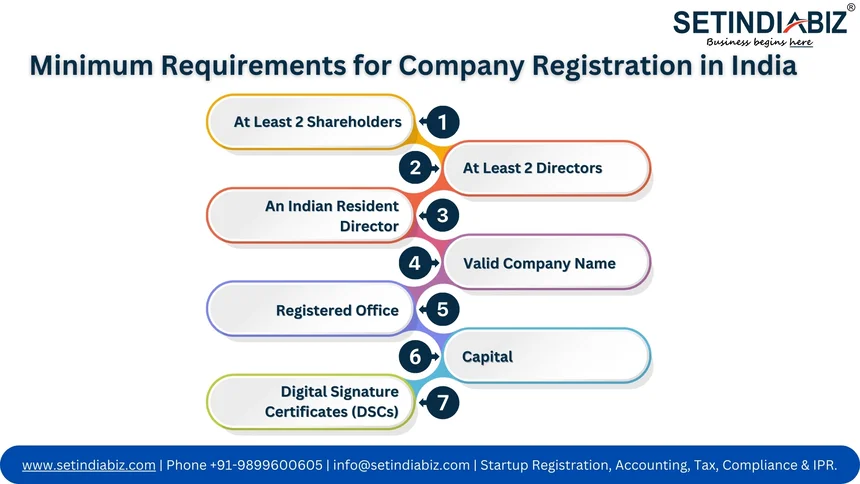This blog explains the minimum requirements for Company Registration in India as per the Companies Act, 2013. These requirements are essential to incorporate a private limited company and provide it a distinct legal identity for all practical purposes.
A Private Limited Company is a Company formed under the Companies Act offering essential features like transfer of ownership through shares, limited liability to shareholders, and continued existence for an indefinite period. Since it is a distinct legal entity, the Companies Act makes their incorporation mandatory by the Registrar of Companies, subject to the fulfillment of certain minimum requirements. Understanding these minimum requirements for company registration in India is quite essential for a successful incorporation process.
Minimum Requirements for Company Registration in India
The minimum requirements for company registration in India are conditions which must be fulfilled before starting a private limited company. These requirements deal with all the important prerequisites of a company including its shareholders, directors, name, registered office, and capital. Additionally, the authorized director must possess a Class 3 DSC to authenticate the application for company registration and attest all the required forms and documents.

1. At Least 2 Shareholders
Shareholders are co-owners of a Private Limited Company. The percentage of their ownership is decided by the ratio of their shareholding. A Private Limited Company must have at least 2 Shareholders, and extend their maximum number to 200. These shareholders can either be individuals or corporate entities, Indian or foreign in origin. There is no requirement of nationality or residence restricted for them. However, if the shareholder is a foreign citizen or a foreign corporate entity, then the FDI rules and regulations need to comply and appropriate FDI reporting needs to be made to RBI in form FC-GPR. The first shareholders of a company are collectively known as its promoters. The promoters are free to decide the shareholding ratio, and that becomes the basis on which the first shareholder subscribes to the number of equity shares.
2. At Least 2 Directors
Directors are authorities appointed by the shareholders to control the management of a company. They are responsible to oversee the day-to-day operations of the company, and ensure its compliance with various regulatory laws. To start a Private Limited Company, a minimum of 2 directors are required. They must be non-minors and individuals, whether Indian or foreign in origin. This number can be extended to 15 as per the Companies Act. However, the shareholders can raise the number of directors beyond 15 if need be, by passing a resolution to this effect in the General Meeting. Moreover, he must not be disqualified under Section 164 of the Companies Act. Note here that the same individual can be appointed as the director as well as shareholder. However, these are two separate designations in a company and it is crucial to know the difference between a shareholder and director.
3. An Indian Resident Director
We are already aware that the maximum number of directors in a company can be extended to 15, and there is no restriction on their nationality. They can either be Indian or foreign citizens. However, the Companies Act puts a restriction on the resident status of at least one director in a Private Limited Company. It prescribes that at least one of the directors appointed in a Private Limited Company must be an Indian Resident. An Indian Resident Director is one who has stayed in India for more than 120 days in the previous financial year. These days need not be continuous and can be counted as the overall days of stay.
4. Valid Company Name
One of the other important minimum requirements for company registration in India is an ROC approved name. For this, a valid and appropriate name must be chosen as per the guidelines prescribed by the MCA. It must not be similar, or identical to the name of an existing company or infringe an existing or applied trademark. Also, it must not contain words prohibited for use under the Names & Emblems Act. After an appropriate name is chosen, it needs to be proposed to the ROC for approval in the SPICe Plus application. The ROC, after examining the application either accepts or rejects the name. If the name is accepted, it shall be reserved in the name of the company for a period of 20 days, within which the company must get incorporated and gain a legal existence. On the other hand, if it gets rejected a fresh application for name approval will have to be filed.
5. Registered Office
Companies need to maintain a Registered Office at all times as per section 12 of the Companies Act, 2013. A Registered Office is the office address with which a company gets incorporated. This address is maintained by the ROC in all its public records and is accessed by all government authorities and other private stakeholders for official communication and correspondence. A Registered Office is where the company maintains all its official documents and accounts for inspection by tax and regulatory authorities as well. A company’s Registered Office must be fully constructed and lockable. Moreover, it must be situated on commercial / residential land. It may be rented or self-owned by the company owner. In either case, a No Objection Certificate needs to be issued by the office property owner.
6. Capital
Capital is the funds that a company receives from its shareholders in exchange for equity shares. There are no minimum requirements for Company Registration in India when it comes to capital, and shareholders are free to contribute as per their will. However, it is always suggested that the amount of capital deposited by the shareholders is adequate to conduct its day to day business operations.
7. Digital Signature Certificates (DSCs)
The application process for Company incorporation is completely digital. To complete it, a form is required to be filled and submitted online along with the prescribed set of documents authenticated and attested using the Class 3 Digital Signature Certificate of the authorized director or signatory. Digital Signature is the electronic equivalent of a physical signature, encrypted for enhanced security which makes it non-foregable and unique.
Conclusion
Understanding and adhering to the Minimum Requirements for Company Registration in India are paramount for a seamless and legally sound incorporation process. These prerequisites, encompassing shareholder and director criteria, a valid and distinctive company name, a registered office address, adequate capital, and the essential use of Digital Signature Certificates, form the foundational pillars of establishing a Private Limited Company under the Companies Act, 2013. Complying with these stipulations not only ensures compliance with regulatory frameworks but also sets the stage for a successful business journey, granting your company the distinct legal identity and privileges it deserves within the Indian corporate landscape.
FAQs
Q1: Can a foreign individual or company be a shareholder in a Private Limited Company?
Yes, foreign individuals and entities can be shareholders in an Indian Private Limited Company. The Companies Act allows both Indian and foreign shareholders, with no restrictions on nationality or residence. However, if a shareholder is a foreign entity, they must adhere to Foreign Direct Investment (FDI) regulations and reporting requirements as specified by the Reserve Bank of India (RBI).
Q2: Is it mandatory for all directors of a Private Limited Company to be Indian residents?
While the maximum number of directors can include both Indian and foreign nationals, at least one director of a Private Limited Company must be an Indian resident. An Indian resident director is defined as an individual who has spent more than 120 days in India during the preceding financial year.
Q3: What is the significance of a DSC in the company registration process?
A Digital Signature Certificate (DSC) plays a crucial role in the online application process for company registration. It serves as an electronic equivalent of a physical signature, ensuring the authenticity and security of documents submitted online. The Class 3 DSC of an authorized director or signatory is used to authenticate and attest the required forms and documents during the incorporation process.
Q4: Can a Private Limited Company have more than two shareholders and directors?
Yes, a Private Limited Company can have more than two shareholders and directors. While the minimum requirement is two shareholders and directors, the Companies Act allows for up to 200 shareholders and a maximum of 15 directors. The shareholders can pass a resolution to increase the number of directors beyond 15 if necessary.
Q5: What happens if the proposed company name is rejected by the ROC?
If the proposed company name is rejected by the ROC, a fresh application for name approval will need to be filed with an alternative name choice. It’s important to choose a name that is unique, compliant with MCA guidelines, and does not infringe upon existing trademarks or company names. Once the name is accepted, it will be reserved for 20 days during which the company must complete its incorporation process.


I loved as much as you’ll receive carried out right here.
The sketch is tasteful, your authored material stylish.
nonetheless, you command get bought an impatience over that you wish be
delivering the following. unwell unquestionably come further formerly again as exactly the
same nearly very often inside case you shield this hike.